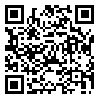Volume 5, Issue 1 (8-2024)
پژوهش های مابعدالطبیعی 2024, 5(1): 188-211 |
Back to browse issues page
Download citation:
BibTeX | RIS | EndNote | Medlars | ProCite | Reference Manager | RefWorks
Send citation to:



BibTeX | RIS | EndNote | Medlars | ProCite | Reference Manager | RefWorks
Send citation to:
Akbari Takhtameshlou J, Farzan A. Artificial Intelligence and Inference to the Best Explanation: Can a Machine Have the Same Level of Intelligence as Humans?. پژوهش های مابعدالطبیعی 2024; 5 (1) :188-211
URL: http://mi.khu.ac.ir/article-1-289-en.html
URL: http://mi.khu.ac.ir/article-1-289-en.html
1- Sharif University of Technology , jakbarit@sharif.edu
2- Sharif University
2- Sharif University
Abstract: (2191 Views)
Artificial intelligence (AI) is now permeating most aspects of human life, making it necessary to study and assess it from various perspectives, including philosophical ones. A philosophical question in this regard is: Is it possible for AI to reach or even exceed the level of natural human intelligence? Are there any philosophical limitations or obstacles to AI that will basically prevent it from ever reaching such a level? This article aims to address such questions. Based on the article's discussions and results, AI, which has passed two waves so far in its development, in order to enter the third wave and become closer to natural human intelligence, requires the ability to perform a type of context-dependent inference known as "abduction" (also referred to as "inference based on the best explanation"). However, there is basically no clear horizon for the machine regarding this capacity because this type of inference is not formal and computational but rather a creative content-based inference. Indeed, the article comes to the conclusion that while machine intelligence can outperform humans in the purely formal-computational aspects of intelligence, it will never be able to match human intelligence in all aspects as long as it lacks the non-quantitative and non-formal capabilities that humans have, like ‘imagination’, ‘creativity’, ‘understanding’, ‘thinking’, ‘good sense’ and, above all, ‘consciousness’.
Keywords: Artificial (Machine) Intelligence, Natural (Human) Intelligence, Inference to the Best Explanation, Understanding, Consciousness, Mind.
Type of Study: Original Article |
Subject:
Philosophy
References
1. Bonjour, L. (1998), In Defence of Pure Reason, Cambridge: Cambridge University Press.
2. Chakravartty, A. (2017), Scientific Ontology: integrating naturalized metaphysics and voluntarist epistemology, Oxford University Press.
3. Chalmers, D. J. (1997), The Conscious Mind: In Search of a Fundamental Theory, Oxford Paperbacks.
4. Chalmers, D. (2017), "The Hard Problem of Consciousness", in S. Schneider and M. Velmans (eds.), The Blackwell Companion to Consciousness, Wiley-Blackwell, 32-42. [DOI:10.1002/9781119132363.ch3]
5. Chalmers, D. (2022), The Mystery of Consciousness: A Dialogue Between a Neuroscientist and a Philosopher (D. Chalmers and A. Damasio), in M. Gleiser (2022), 1-25. [DOI:10.7312/glei20410-002]
6. Churchland, Paul (2013), Matter and Consciousness, 3rd ed., Cambridge (Massachusetts), London: Mit Press.
7. Churchland, Patricia (1986), Toward a Unified Science of the Mind-Brain, Cambridge, MA.
8. Churchland, Patricia (1996), "The Hornswoggle Problem", Journal of Consciousness Studies, 3(5-6), 402-408.
9. Churchland, Paul, and Churchland, Patricia (1990), "Could a Machine Think?", Scientific American 262, 32-37. [DOI:10.1038/scientificamerican0190-32]
10. Damasio, A. (2022), The Mystery of Consciousness: A Dialogue Between a Neuroscientist and a Philosopher (D. Chalmers and A. Damasio), in M. Gleiser (2022), 1-25. [DOI:10.7312/glei20410-002]
11. Dreyfus, Hubert (1992), What Computers Still Can't Do: A Critique of Artificial Reason, The MIT Press.
12. Dreyfus, Hubert & Dreyfus, Stuart (1986), Mind over Machine: The Power of Human Intuition and Expertise in the Era of the Computer, Simon and Schuster.
13. Dreyfus, Hubert, & Dreyfus, Stuart (1988), "Making a Mind Versus Modeling the Brain: Artificial Intelligence Back at a Branchpoint", Daedalus, vol. 117 (1), 15-43.
14. Gleiser, M. (ed.) (2022), Great Minds Don't Think Alike: Debates on Consciousness, Reality, Intelligence, Faith, Time, AI, Immortality, and the Human, Columbia University Press. [DOI:10.7312/glei20410]
15. Harman, G. H. (1965), "The Inference to the Best Explanation", The Philosophical Review, 74(1), 88-95. [DOI:10.2307/2183532]
16. Larson, E. J. (2021), The Myth of Artificial Intelligence: Why Computers Can't Think the Way We Do, Harvard University Press. [DOI:10.4159/9780674259935]
17. Launchbury, J. (2017, February 15), A DARPA perspective on artificial intelligence, Retrieved Septamber 8, 2023, from https://www.youtube.com/watch?v=-O01G3tSYpU&t=313s
18. Nagel, T. (1974), "What Is It Like to Be a Bat?", The Philosophical Review, 83(4), 435-450. [DOI:10.2307/2183914]
19. Peirce, C. S. (1992). The Essential Peirce: Selected Philosophical Writings, Vol. 1 (1867-1893), edited by Nathan Houser and Christian Kloesel, Indiana University Press.
20. Peirce, C. S. (1998). The Essential Peirce: Selected Philosophical Writings, Vol. 2 (1893-1913), edited by the Peirce Edition Project: Indiana University Press.
21. Searle, J. R. (1980), "Minds, Brains, and Programs", Behavioral and Brain Sciences 3(3), 417-424 and 450-457. [DOI:10.1017/S0140525X00005756]
22. Spitzer, E. (2016), "Tacit Representations and Artificial Intelligence: Hidden Lessons from an Embodied Perspective on Cognition", in V. Müller (ed.), Fundamental Issues of Artificial Intelligence, Springer, 425-441. [DOI:10.1007/978-3-319-26485-1_25]
23. Turing, A. M. (1950), "Computing Machinery and Intelligence", Mind 59, 433-460. [DOI:10.1093/mind/LIX.236.433]
Send email to the article author
| Rights and permissions | |
 |
This work is licensed under a Creative Commons Attribution-NonCommercial 4.0 International License. |








